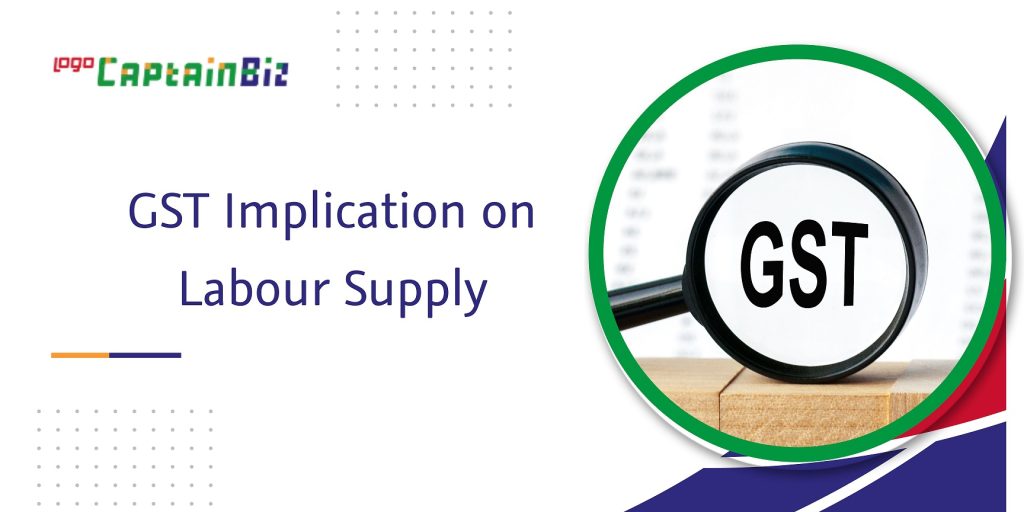GST applies to every supply of goods or services unless a specific exemption is provided by GST law. “Labour Services” is a very usual nature of transaction with which every person interacts at some point or the other point whether for personal or commercial purposes. Therefore, it is pertinent to understand the HSN code and GST on Labour Charges, and its implications on such transactions to avoid any litigations or additional costs.
In this article, we have carried out a detailed discussion on GST Implication on Labour Charges:
1. Meaning of GST on Labour Charges
- GST Law does not provide any specific definition of “Labour Charges”. Therefore, the same has to be understood in common parlance.
- As per common understanding, Labour Contracts are the agreements under which manpower is supplied by the contractor to carry out work as set out in the agreement for a consideration.
- In some cases, supply of Labour is accompanied with supply of material as well, such as, supply of Paint along with Labour for painting work.
2. Types of Labour Contracts
As discussed above, Labour Contract can be following 2 types:
-
Pure Labour Contract:
-
- Contracts under which only manpower is supplied without any accompanying material are considered as “Pure Labour contracts”. A very common example of Pure Labour contract is Supply of Security Services.
- “Labour Supply” is considered as supply of “Services” under GST.
-
Work Contracts:
-
- As per Section 2(119) of The CGST Act, “works contract” means a contract for building, construction, fabrication, completion, erection, installation, etc. of any immovable property wherein property in goods is involved in the execution of such contract.
- E.g. Construction Contract is a common example of works contract under which property in material such as bricks, cement, concrete, etc. is transferred during construction of immovable property.
- As per Entry No. 6(a) of The CGST Act, works contract services are considered as “Supply of Services”.
3. GST Implication on Labour Supply

3.1 GST Rates on Labour Supply
- Pure Labour Contract and Works Contract, both are considered as “Supply of Services” and GST and are liable to GST @ 18% under any specific exemption is provided.
- In general, GST on supply of Labour services is paid by the supplier under forward charge. Therefore, is supplier of Labour services is registered under GST then he shall charge the GST on the invoice raised to recipient of service.
- However, as per point No. 14 of Notification No. 13/2017-Central GST (CGST) Rate dated 28th June, 2017, in case of supply of security services (services provided by way of supply of security personnel), GST shall be payable under service charge Mechanism (RCM) if following conditions are fulfilled:
- Supplier of Service: Any person, other than a body corporate
- Recipient of Service: A registered person, located in taxable territory.
3.2 HSN Code for Labour Supply
Following are the different categories of HSN Code for Labour charges :
| SAC Code | Nature of Service |
| 9986 | Supply of Farm Labour |
| 9954 | Works Contract services |
| 998511 | Executive/retained personnel search services |
| 998512 | Permanent placement services |
| 998513 | Contract Staffing Services |
| 998515 | Long- Term staffing or payroll services |
| 998516 | Temporary staffing-to-permanent placement services |
| 998517 | Co-employment staffing services |
3.3 Exemption on Labour Supply services:
As per Notification No. 12/2017- Central Tax (Rate) dated 28th June, 2017, following Labour supply services are exempted from applicability of GST:
- Pure Labour contracts of construction, erection, commissioning, or installation of original works pertaining to a single residential unit otherwise than as a part of a residential complex. (Point 11 to Notification)
- Pure Labour contracts of construction, erection, commissioning, installation, completion, etc. of a civil structure or any other original works pertaining to the beneficiary-led individual house construction or enhancement under the Housing for All (Urban) Mission or Pradhan Mantri Awas Yojana. (Point No. 10 of Notification).
- Pure services (excluding works contract service or other composite supplies involving supply of any goods) provided to the Central Government, State Government or Union territory or local authority by way of any activity in relation to any function entrusted to a Panchayat under article 243G of the Constitution or in relation to any function entrusted to a Municipality under article 243W of the Constitution. (Point No. 3 of Notification)
3.4 Valuation for GST
- As per Section 15 of The CGST Act, value of supply of goods or services shall be the transaction value.
- Transaction value is price actually paid or payable for said supply where the supplier and the recipient are not related and the price is the sole consideration for the supply.
- The value of supply shall include any taxes, duties, cesses, fees and charges levied under any law for the time being in force other than GST.
- Therefore, consideration charged by the supplier of Labour shall be consideration as taxable value for the purpose of GST.
- In cases, where a supplier of Labour is liable to pay EPF or ESI or any other taxes, then such amount shall also be added to the transaction value and GST shall be charged on the complete amount.
Also Listen: Labour Charges HSN Code With GST Rate: Explained
Frequently Asked Questions (FAQs):
1.What is the difference between a works contract and a pure labor contract in GST?
A works contract on the other hand is a composite supply where service feature prevails over the supply of goods, labor being majorly incorporated in the supply of materials. Section 2(119) of the CGST Act, 2017 identifies it and GST is levied on the whole contract amount.
2.What is the impact of introducing GST to the current labor charges of the building projects?
In turn, brevity of the overall course of sale consideration for the labor contracts, in general, has decreased with the launch of the GST than before when there were many taxes such as excise, VAT, and the service tax applied. In GST these taxes are integrated at one tax.
3.What is the value of supply made for ascertaining GST on the labor charges?
Transaction value is calculated as supply value in the context of GST, and this value compasses all the protective costs and taxes excluding IGST, CGST, and SGST. Others, any other expense incurred by the service recipient for the benefit of the labor supplier must also be added.
4.What extent are there any GST exemptions for the labor services supplied to the government departments?
Services provided in connection with the activities delegated to a Panchayat or a Municipality in terms of articles 243G and 243W of the Indian Constitution are outside the GST ambit. This entails services such as cleaning and disposal of waste and other important public utilities.
5.What are impacts or consequences in the GST context if the labor contractor has not registered for GST?
Though, It is mandatory for the labor contractor to register under GST still if the labor contractor is not registered, then the service recipient needs to pay GST under reverse charge mechanism. This changes the burden of paying the amount of GST from the supplier side to the recipient side.
6.What is the exemption of GST in a pure labor contract?
The construction of a single house , independent house and the original works on buildings and civil structures where GST is nil or specific/excised rate of GST as per Notification No 12/2017 of central tax to be granted to the jeweler for pure labor contracts that are involved in works like construction of a single house and the original works under the government schemes such as Pradhan Mantri Awas Yojana.
7.Whether the credit of input tax is available to the labor contractor under GST?
Yes, for instance given that the labor contractor is registered under GST then they can levy GST on the supply of labor and they can also claim the ITC on the inputs which are acquired in the provision of the labor service.
8.How is GST on time Incidental expenses such as EPF & ESI calculated in contractual Labour agreement?
GST is calculated on the total value of supply that is Basic Labour Charges, plus any additional Labour cost consisting of EPF & ESI in case they are recovered from the service receiver. The totality of these amounts including these charges, attracts GST on the rate that is provided for under the law.
9.If the labor contract also includes the provision of both the GST exempted and taxable services what takes place?
If a labor contract involves exempt and taxable supplies, then the supplier is allowed to charge and account for GST on the supplies that are subject to GST while the supplies that are covered under the labor contract that are exempt will not attract GST. Both the taxable and the exempt ones should be calculated and reported separately to meet the legislation requirements and avoid misrepresentation regarding GST.
10.What action should a service recipient take if a labor contractor charged GST unsuitably?
However, leaving the responsibility of compliance to GST on the appropriate service recipient, is provided for in the law in situations where the labor contractor has not charged GST correctly. The recipient should inform the contractor of the problem and demand a proper invoice. In the event the contractor fails in doing so the recipient has to pay the GST under reverse charge mechanism and make sure that the right amount of tax is passed on to the government.

